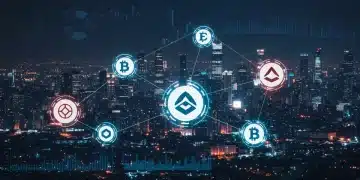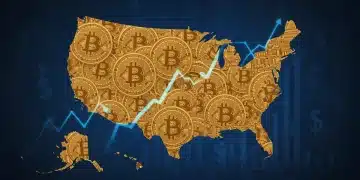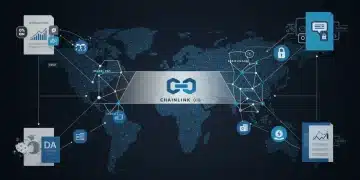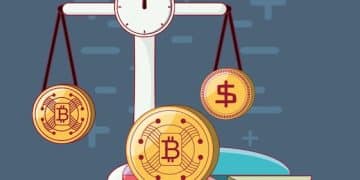Altcoin Use Cases: Real-World Applications Beyond Speculation

Altcoins are increasingly demonstrating real-world utility beyond speculative investments, driving innovation across various sectors, from decentralized finance (DeFi) and supply chain management to identity verification and digital collectibles.
The world of altcoins extends far beyond the volatile landscape of speculative trading. While price fluctuations often dominate headlines, the true potential of these alternative cryptocurrencies lies in their diverse and innovative real-world applications. Let’s delve into some compelling altcoin use cases: exploring real-world applications beyond speculation.
Understanding the Broader Landscape of Altcoins
Altcoins, or alternative cryptocurrencies to Bitcoin, represent a vast and varied ecosystem. They are designed with different functionalities and purposes, catering to specific needs and solving unique problems. Understanding this diversity is crucial to appreciating their potential.
Key Features and Innovations
Altcoins often introduce innovative features that aim to improve upon Bitcoin’s design. These features can include faster transaction times, different consensus mechanisms, and enhanced privacy features.
- Smart Contracts: Platforms like Ethereum enable the creation of smart contracts, which automate agreements and processes, unlocking new possibilities for decentralized applications (dApps).
- Privacy Features: Altcoins like Monero and Zcash prioritize user anonymity, providing enhanced privacy for transactions.
- Scalability Solutions: Many altcoins are exploring layer-2 scaling solutions to improve transaction throughput and reduce fees.
These innovations are driving adoption and expanding the possibilities for practical use cases. Understanding the core technology and value proposition of each altcoin is essential for identifying its potential impact.
In conclusion, recognizing the breadth and depth of the altcoin landscape reveals their potential to solve specific problems and cater to niche markets. This understanding forms the basis for exploring their real-world applications.
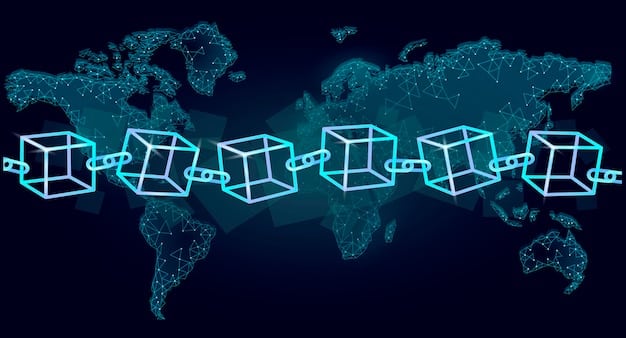
Altcoins in Decentralized Finance (DeFi)
Decentralized Finance (DeFi) has emerged as a groundbreaking application of blockchain technology, and altcoins are playing a pivotal role in its growth. DeFi aims to recreate traditional financial services in a decentralized and transparent manner, offering opportunities for lending, borrowing, trading, and yield farming.
Lending and Borrowing Platforms
Altcoins power decentralized lending and borrowing platforms by providing the necessary liquidity and infrastructure. These platforms allow users to lend out their crypto assets in exchange for interest or borrow assets by providing collateral.
Decentralized Exchanges (DEXs)
DEXs enable peer-to-peer trading of cryptocurrencies without the need for a central intermediary. Altcoins facilitate trading on DEXs and often provide incentives for users to provide liquidity.
- Automated Market Makers (AMMs): AMMs like Uniswap and SushiSwap rely on liquidity pools powered by altcoins to facilitate trading.
- Yield Farming: Users can earn rewards by providing liquidity to DEXs, often incentivized with additional altcoins.
- Governance Tokens: Many DeFi protocols use governance tokens to allow community members to vote on protocol upgrades and changes.
DeFi is transforming the financial landscape, offering greater accessibility, transparency, and control to users. Altcoins are essential components of this ecosystem, driving innovation and creating new opportunities for financial participation.
In short, altcoins are integral to the DeFi revolution, powering decentralized lending, trading, and other financial services. Their role is set to expand further as the DeFi space continues to evolve and mature.
Supply Chain Management with Altcoins
Supply chain management is another area where altcoins are demonstrating significant potential. By leveraging blockchain technology, altcoins can enhance transparency, traceability, and efficiency in supply chains, reducing fraud and improving accountability.
Tracking and Traceability
Altcoins can be used to track the movement of goods and materials throughout the supply chain, from origin to end consumer. This provides real-time visibility and helps prevent counterfeiting and theft.
Enhanced Transparency and Accountability
By recording supply chain data on a blockchain, altcoins ensure that all stakeholders have access to the same information, fostering trust and reducing disputes. This transparency can also help identify inefficiencies and bottlenecks.
- Provenance Tracking: Altcoins can verify the authenticity and origin of products, essential for industries like food and pharmaceuticals.
- Smart Contracts for Automation: Smart contracts can automate processes like payment settlements and quality control checks.
- Improved Efficiency: Real-time data and automated processes streamline operations and reduce administrative overhead.
Altcoins are enabling more efficient, transparent, and secure supply chains. Their use is expected to grow as businesses recognize the benefits of blockchain technology for supply chain management.
In summary, altcoins offer a promising solution for supply chain challenges, providing increased transparency, better traceability, and more efficient operations. This leads to improved trust among stakeholders and reduced risks.
Digital Identity and Altcoins
Digital identity is becoming increasingly important in the digital age, and altcoins are exploring ways to create more secure, private, and user-controlled identity solutions. Decentralized identity systems built on blockchain technology can address many of the challenges associated with traditional identity management.
Self-Sovereign Identity (SSI)
SSI allows individuals to control their own identity data without relying on central authorities. Altcoins can provide the underlying infrastructure for SSI solutions, enabling users to manage their credentials and selectively share information.
Immutable and Secure Identity Data
By storing identity data on a blockchain, altcoins ensure that it is tamper-proof and secure. This helps prevent identity theft and fraud.
- Decentralized Identifiers (DIDs): DIDs are unique identifiers that can be used to verify identity without revealing personal information.
- Verifiable Credentials: Verifiable credentials allow users to prove specific attributes about themselves without disclosing unnecessary data.
- Enhanced Privacy: Blockchain-based identity solutions can minimize the amount of personal data that is shared with third parties.
Altcoins are paving the way for more secure and user-centric digital identity systems. These systems can empower individuals and enhance trust in online interactions.
To conclude, altcoins are driving innovation in digital identity, enabling self-sovereign identity and secure data management. This has the potential to revolutionize how we manage and protect our identities online.

Altcoins in the World of NFTs and Digital Collectibles
Non-fungible tokens (NFTs) have gained immense popularity as a way to represent ownership of unique digital assets. Altcoins are crucial for facilitating the creation, trading, and management of NFTs, opening up new possibilities for artists, creators, and collectors.
Creating and Trading NFTs
Altcoins like Ethereum and Solana provide the blockchain infrastructure for creating and trading NFTs. These platforms offer tools and standards for issuing tokens that represent digital artwork, music, virtual real estate, and other unique assets.
Fractional Ownership and Accessibility
Altcoins can enable fractional ownership of NFTs, allowing multiple individuals to own a share of a high-value asset. This increases accessibility and liquidity in the NFT market.
- Smart Contracts for Royalties: Smart contracts can automatically distribute royalties to creators each time their NFT is resold.
- Decentralized Marketplaces: Altcoins power decentralized NFT marketplaces that offer greater transparency and lower fees.
- New Revenue Streams: NFTs create new revenue streams for artists and creators by allowing them to directly monetize their work.
Altcoins are driving the growth of the NFT market and empowering creators to connect with their audiences in new ways. They are enabling innovative business models and transforming the digital art and collectibles landscape.
In conclusion, altcoins play a vital role in the NFT ecosystem, providing the technology for creating, trading, and managing digital collectibles. This is transforming how digital assets are valued and exchanged.
Gaming and Entertainment Applications of Altcoins
The gaming and entertainment industries are increasingly exploring the use of altcoins to enhance user experiences, create new revenue models, and foster community engagement. Altcoins can power in-game economies, reward players, and enable the creation of decentralized gaming platforms.
In-Game Currencies and Rewards
Altcoins can serve as in-game currencies, allowing players to earn rewards, purchase items, and trade with one another. This creates a more engaging and rewarding gaming experience.
Decentralized Gaming Platforms
Altcoins can be used to build decentralized gaming platforms that are more transparent and resistant to censorship. These platforms can empower developers and players by giving them greater control over the gaming ecosystem.
- Play-to-Earn Models: Altcoins enable play-to-earn models where players can earn cryptocurrency rewards for their participation and skill.
- In-Game Asset Ownership: Players can truly own their in-game assets, which can be traded and used across different games.
- Community Governance: Altcoins can be used to give players a say in the development and governance of games.
Altcoins are transforming the gaming and entertainment industries, creating new opportunities for innovation and community participation. Their use is expected to grow as more developers and players recognize the benefits of blockchain technology.
To sum up, altcoins are revolutionizing the gaming and entertainment sectors by enabling in-game economies, play-to-earn models, and decentralized platforms. This enhances the gaming experience and offers new avenues for community engagement.
Challenges and Future Prospects
While the use cases for altcoins are promising, there are also challenges that need to be addressed. These include scalability issues, regulatory uncertainty, and security concerns. However, with ongoing technological advancements and increasing adoption, the future prospects for altcoins remain bright.
Scalability Solutions
Scalability remains a significant challenge for many altcoins. Layer-2 scaling solutions, such as sidechains and state channels, are being developed to improve transaction throughput and reduce fees.
Regulatory Clarity
Regulatory uncertainty can hinder the adoption of altcoins. Clear and consistent regulations are needed to provide businesses and individuals with the confidence to use altcoins for real-world applications.
- Security Audits: Regular security audits and best practices are essential to protect against vulnerabilities and attacks.
- Continued Innovation: Ongoing research and development are needed to improve the functionality and efficiency of altcoins.
- Education and Awareness: Educating the public about the benefits and risks of altcoins is crucial for fostering adoption.
Despite these challenges, the future of altcoins is promising. With continued innovation and increasing adoption, altcoins have the potential to transform various industries and improve people’s lives.
In short, addressing scalability, regulatory, and security challenges is essential for realizing the full potential of altcoins. Continued innovation and education will pave the way for their broader adoption and integration into real-world applications.
| Key Point | Brief Description |
|---|---|
| 💰 DeFi Integration | Powering lending, trading, and yield farming in decentralized finance. |
| 📦 Supply Chains | Enhancing transparency and traceability in supply chain management. |
| 🆔 Digital Identity | Enabling secure and user-controlled digital identity solutions. |
| 🎨 NFTs | Facilitating the creation and trading of unique digital assets. |
FAQ
▼
Altcoins are cryptocurrencies other than Bitcoin. They often aim to improve upon Bitcoin’s design by offering faster transactions, different consensus mechanisms, or enhanced privacy features, fulfilling niche needs in the blockchain space.
▼
Altcoins power decentralized finance (DeFi) platforms through lending, borrowing, trading, and yield farming. They provide liquidity for decentralized exchanges (DEXs) and enable automated market makers (AMMs), fostering innovation in financial services.
▼
Altcoins enhance supply chain management by improving transparency and traceability. They track goods from origin to consumer, preventing fraud, ensuring accountability, and streamlining supply chain processes for greater efficiency.
▼
Altcoins enable self-sovereign identity (SSI) by securing identity data on blockchains. They allow users to control their identity, verify information without revealing personal data, and minimize data shared with third parties, enhancing privacy.
▼
Altcoins drive in-game economies and play-to-earn models, rewarding players with cryptocurrency. They enable decentralized gaming platforms, offering transparency, community governance, and true in-game asset ownership, transforming the gaming experience.
Conclusion
In conclusion, the diverse use cases of altcoins extend far beyond speculation, driving innovation across various industries. Whether it’s transforming finance through DeFi, enhancing supply chain transparency, securing digital identities, revolutionizing the NFT space, or enhancing gaming experiences, altcoins are demonstrating their potential to create real-world value. As technology advances and adoption increases, the future looks promising for these alternative cryptocurrencies.
